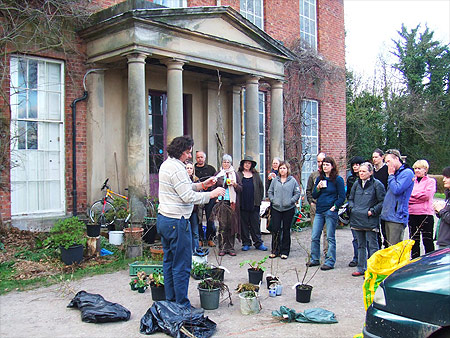
| HOME |
| NERVE |
| REVIEWS |
| ARCHIVE |
| EVENTS |
| LINKS |
| ABOUT US |
| CONTRIBUTORS |
| BACK ISSUES |
| CONTACT US |
 Forest
Gardening in Shropshire
Forest
Gardening in Shropshire
By Tracey
Dunn 20/5/2011
Photo by Ian Watt
Berrington Hall in Shrewsbury was built a few hundred years ago, a beautiful, huge Georgian house set within twenty acres of land. In the 1970's it was bought by a wholefood shop owner from Cambridge who turned it into a commune which is a place for communal living. At Berrington Hall this entails giving two days a week to help maintain the building and cook once every seven days for everyone. Today it is part of 'Diggers and Dreamers'...a Radical Routes Housing Cooperative. It is run as a place for Low Impact living which is about being as environmentally friendly as possible..including growing some of your own food, recycling and using a wood fired heating system.
About 20 of us attended the Forest Garden two day course run by Steve Jones with his assistant Ian Watt. Steven has a very varied experience including living at the Centre For Alternative Technology in Wales for seven years,working in India and visiting urban gardens in New York. We were a mixture of people including environmentalists, gardeners, farmers, and Forest School educators. Forest Gardening is about working in harmony with nature using no pesticides or fertilizers. It utilizes companion planting like planting pear trees or strawberries next to each other as they help each other grow.
Forest Gardening is not about straight rows or same height plants but planting so everything gets the optimum light like putting small plants at the front. There is also the idea that it is best not to dig the soil over as this causes unwanted plants to grow. It is working with what you have around you,learning about growing cycles,collecting your own seeds and planting extra food for wildlife.
We first watched slides and videos of various Forest Garden projects including 'The greening of the desert' by Geoff Lawton and Sepp Holzer who works at a very high altitude on a hillside. We went into the forest on the grounds and were shown how the forest cycle works. There is cover on all the earth by ivy, twigs and mulch from previous living plants. I discovered that ivy living on trees is not harmful but just reaching for the light which is the goal for every living plant.
We were taught about the root systems of plants. Asparagus roots go down over ten feet to search out nutrients. We saw slides of spaces like gardens on roofs of buildings or walls which can have flat fruit trees growing against them. Composting is using food waste and even cardboard. Some people were happy to put cooked food on their compost pile but others, possibly town dweller felt this might encourage rats. It's also recommended to leave the compost bin lid on just half covering the bin and then swapping it around. Ultimately it's about what works for you really. Just last week I helped build a compost with alternate layers of police horse manure,used hops from a local brewery and soil.
We planted our own Forest Garden with various trees including a sea buck thorn adding lots of ash to help it grow. We placed lots of cardboard and mulch on the surface to give the plants nutrients and keep away the grass. Strawberries, blueberries (with no ash added), herbs and many other varied plants were also planted out.
Forest Gardening seems to be about spontaneity, ideas, feelings and experiments. As we move into unseen territory due to fossil fuels like oil not being readily available we have to adapt new ways of living. Forest Gardening is just one valid way of adjusting to this new challenge. Check out Steve's website www.sector39.co.uk for his future courses.
Sorry Comments Closed
Comment left by Jo Ridley on 21st May, 2011 at 16:30
I found this article interesting - thanks Tracey - I'm just sorry I didn't go on the course, but I'll try and get on the next one. I was talking to Matt about possibly trying to organise some permaculture courses down at the community allotment- watch this space.